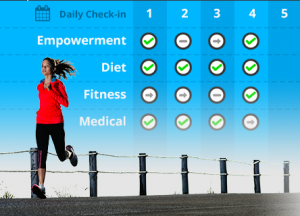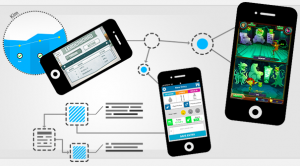Last night we had our final Medical Media Arts Lab presentations—a bittersweet culmination of all of the hard work we as a class have put forth throughout the semester. My group finally had the opportunity to present a detailed plan and accompanying visuals detailing our mobile app solution for improving patient-doctor communication regarding shared treatment plans for Type II diabetics. Professionals in the audience gave us some very valuable feedback and suggestions, which, should the project continue, would greatly improve our existing design and the user experience. Our app focuses on improving patient adherence by creating shared treatment plans that take both the patient and doctor’s needs into consideration. To enhance our design, it was suggested that we add a reward component that provides positive feedback to patients who follow their treatment plans, as well as include an avenue for patients to socialize in an effort to increase motivation and accountability. I assumed that these were components our team would need to develop; however, it turns out that mHealth startups have already started to explore these possibilities, both within the context of diabetes, and for chronic and other health conditions in general.
I came across these emerging businesses on the mHealth News website, outlined in an article entitled “Startups bolster adherence via social networking, mobile apps.” Ayogo and Get Real Health “offer a care coordination platform and mobile application, respectively, that seek to improve on…abysmal adherence statistics.” I was particularly interested in Ayogo, which utilizes a health behavior change and gamification platform called GoodLife to establish meaningful social interactions between patients, patients and their family members, and patients and their doctors around their health condition.
The platform also utilizes psychological triggers and secondary applications to personalize the user experience. The specific mobile app used by Ayogo is called Empower, which “helps patients who are newly diagnosed with a chronic condition to take control of their treatment.” The app organizes the patient’s treatment plan into a ‘health habit curriculum’ that uses behavior change principles, self-reporting, social interactions, and a rewards system to encourage adherent patient behavior.
The app tries not only to engage patients in their prescribed treatment plans, but also to actually establish new habits in the patient’s daily life by having them complete small activities or games each day that both facilitate the patient-reward system, but also help the program tailor to the patients’ needs. By actively engaging patients with the app through games, rewards, and social features, Empower, and more broadly Ayogo, helps patients improve adherence to their treatment plans.
It seems that the only missing component is the facilitation of real-time patient-doctor communication about the treatment plan. This app offers what to me seems like a brilliant, innovative proposal to a problem common across nearly all chronic health conditions; however, our development offers that extra, crucial component addressing the in-person patient-doctor encounter. As we move forward, app developers should remain open to learning and growing from the work of other startups. Mobile health is a rapidly growing field that offers much opportunity for profit and competition. However, let us not lose sight of the key stakeholder—the patient. As the race for the next innovation commences, we need to make sure that all possibilities are considered, collaboration is encouraged, and innovation is allowed to reach its full potential.
http://www.mhealthnews.com/news/startups-bolster-adherence-social-networking-mobile-apps



